2019 SkS Weekly Climate Change & Global Warming Digest #18
Posted on 5 May 2019 by John Hartz
Story of the Week... Interview of the Week... Toon of the Week... Photo of the Week... SkS Spotlights... Coming Soon on SkS... Climate Feedback Reviews... SkS Week in Review... Poster of the Week...
Story of the Week...
Biodiversity crisis is about to put humanity at risk, UN scientists to warn
‘We are in trouble if we don’t act,’ say experts, with up to 1m species at risk of annihilation
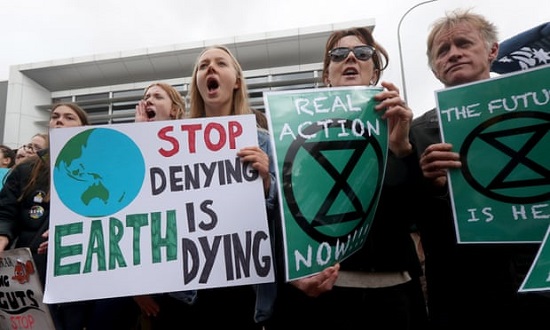
Students protest in Adelaide. UN experts warned people alive today are at risk unless urgent action is taken. Photograph: Kelly Barnes/EPA
The world’s leading scientists will warn the planet’s life-support systems are approaching a danger zone for humanity when they release the results of the most comprehensive study of life on Earth ever undertaken.
Up to 1m species are at risk of annihilation, many within decades, according to a leaked draft of the global assessment report, which has been compiled over three years by the UN’s leading research body on nature.
The 1,800-page study will show people living today, as well as wildlife and future generations, are at risk unless urgent action is taken to reverse the loss of plants, insects and other creatures on which humanity depends for food, pollination, clean water and a stable climate.
The final wording of the summary for policymakers is being finalised in Paris by a gathering of experts and government representatives before the launch on Monday, but the overall message is already clear, according to Robert Watson, the chair of the Intergovernmental Science-Policy Platform on Biodiversity and Ecosystem Services (IPBES).
Biodiversity crisis is about to put humanity at risk, UN scientists to warn by Jonathan Watts, Environment, Guardian, May 3, 2019
Interview of the Week...
Why Bill McKibben Sees Rays of Hope in a Grim Climate Picture
The world has done little to tackle global warming since Bill McKibben’s landmark book on the subject was published in 1989. In an e360 interview, McKibben talks about the critical time lost and what can be done now to avoid the worst impacts of climate change.
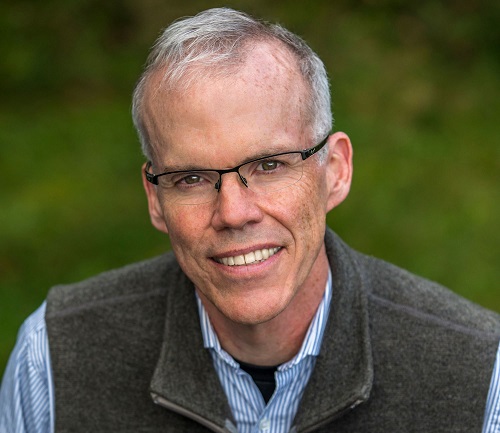
Bill McKibben CREDIT: NANCIE BATTAGLIA
Three decades ago, Bill McKibben published The End of Nature, the first book on climate change aimed at a general audience. McKibben went on to found the international environmental group 350.org, help launch the fossil fuel divestment movement, and write a dozen more non-fiction books, as well as a novel. In 2014, McKibben received the Right Livelihood Award, sometimes referred to as the “alternative Nobel,” for mobilizing popular support for “strong action to counter the threat of global climate change.”
McKibben’s latest book, Falter: Has the Human Game Begun to Play Itself Out?, was published this month and debuted last week on the New York Times bestseller list. In an interview with Yale Environment 360 , McKibben talks about why the critical time for action on climate was missed, where he still finds hope, and what the world will look like three decades from now.
“Thirty or 50 years out, the world’s going to run on sun and wind, because they’re free,” McKibben says. “The question is… what kind of world will it be?”
Why Bill McKibben Sees Rays of Hope in a Grim Climate Picture, Interview by Elizabeth Kolbert, Yale Environment 360, Apr 30, 2019
Toon of the Week...
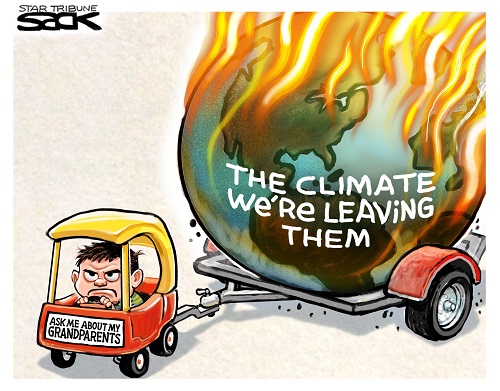
Photo of the Week...
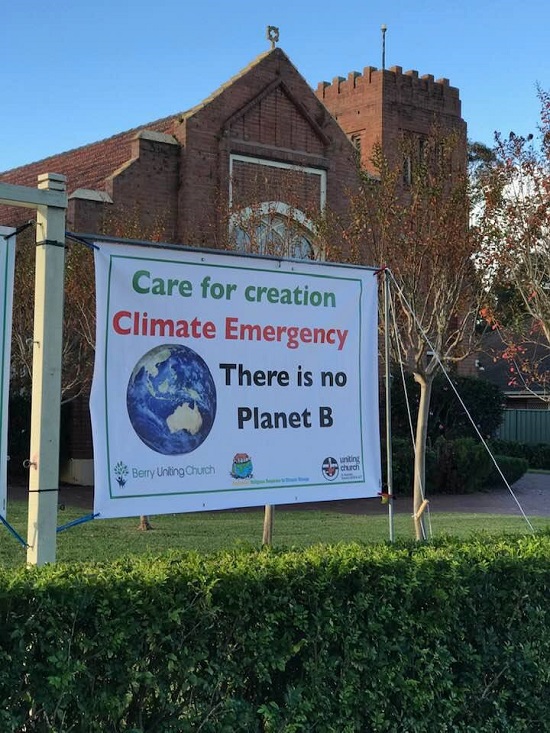
Source: FB Page of the Australian Religious Response to Climate Change (ARRCC)
SkS Spotlights...
![]()
What is the rationale behind Climate Change Knowledge Portal (CCKP)?
In an effort to serve as the hub for climate-related information, data, and tools, the World Bank (WB) created the Climate Change Knowledge Portal (CCKP). The Portal provides an online platform for access to comprehensive global, regional, and country data related to climate change and development. The successful integration of scientific information in decision making often depends on the use of flexible frameworks, data, and tools that can provide comprehensive information to a wide range of users, allowing them to evaluate how to apply the scientific information to the design of a project or policy.
What does the CCKP entail?
The CCKP provides a web-based platform to assist in capacity building and knowledge development. The portal aims to provide development practitioners with a resource to explore, evaluate, synthesize, and learn about climate-related vulnerabilities and risks at multiple levels of details. Using climate science research results to inform the decision making process concerning policies or specific measures needed to tackle climate impacts, or even to understand low carbon development processes, is often a difficult, yet crucial, undertaking.
The CCKP contains environmental, disaster risk, and socio-economic datasets, as well as synthesis products, such as the Climate Adaptation Country Profiles and Climate Smart Agriculture Profiles, which are built and packaged for specific user-focused functions in a particular country or sector. The portal also provides intelligent links to other resources and tools.
The CCKP consists of spatially and temporally referenced data. Users are able to evaluate climate-related vulnerabilities, risks, and actions for a particular location on the globe by interpreting climate and climate-related data at different levels of details.
What can users achieve using CCKP?
- Learn about climate and climate related datasets at the global, regional, and country level.
- Enhance knowledge on climate change related topics, including exposure, vulnerability, sectoral impacts, and adaptation options.
- Assess, visualize, and download resourceful climate data and information.
Coming Soon on SkS...
- Former climate 'denier' regrets 'how wrongheaded but certain I was' (Karen Kirk)
- Inspiring, not depressing, film fest messages (Daisy Simmons)
- State of the climate: Heat across Earth’s surface and oceans mark early 2019 (Zeke Hausfather)
- Why my fears about climate change made me cross the line that separates academia from activism (James Dyke)
- New research this week (Ari)
- 2019 SkS Weekly Climate Change & Global Warming News Roundup #19 (John Hartz)
- 2019 SkS Weekly Climate Change & Global Warming Digest #19 (John Hartz)
Climate Feedback Reviews...
[To be added.]
Poster of the Week...
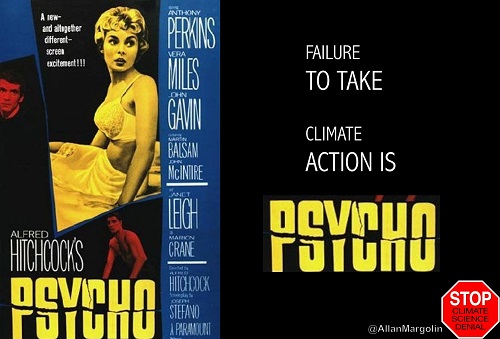
SkS Week in Review...
- 2019 SkS Weekly Climate Change & Global Warming News Roundup #18 by John Hartz
- New research, April 22-28, 2019 by Ari Jokimäki
- What's Earth's ideal temperature?, YouTube Video by Climate Adam
- Climate change could cost the U.S. economy hundreds of billions a year by 2090 by Dana Nuccitelli (Yale Climate Connections)
- Rebellious Times by John Mason
- 2019 SkS Weekly Climate Change & Global Warming Digest #17 by John Hartz































 Arguments
Arguments






























Regarding the biodiversity crisis, specifically the decline of pollinating insects. This is of course serious, but some have hyped it to the same level as the climate crisis which doesn't look justified. Basically I have read a lot of claims that decline in insects would literally wipe out agriculture, and to satisfy my curiosity a quick google search shows a more nuanced picture.
Approx. 30% of food crops depend on pollinators mostly bees, and this is typically fruits etc not staple food products. General article here. Research article discussed in Nature Journal here.Hand pollination is also possible. This is not to downplay the problem but it looks like climate change is the more pressing concern to me.
Climate change and mass extinction are going hand in hand, Nigel. Both are caused by unsustainable growth.
One out of the estimated eight million species are already in jeopardy. Including worms we need for a healthy soil, 75% of insects which are also food for birds, and 25% of all kinds of mamals. Not to forget that species are dying out BECAUSE of climate change. But we also need to stop poisonning our planet with chemicals like the total herbicide Glyphosate.
Sir Charles @2, I have already heard climate denialists saying we have our priorities wrong, because they claim insect decline is more serious than climate change! I was just putting it in perspective.
However I think you are generally right these problems all go hand in hand and have some similar causes. And our rates of growth are clearly unsustainable. Worse still our current population of around 7 billion if all living middle class lifestyles would be unsustainable. A lot of things have to change, starting with doing more gently promoting lower fertility rates.
Correcting the ways of living of the least sustainable, highest consuming, highest impacting portion of the global population would produce more benefit for the future of humanity than 'more' attempts to limit population growth (though both are important for the sustainability of humanity). The end of this comment is a point connected to limiting population.
Biodiversity loss and climate change are both harmful results of a higher level Crisis facing humanity.
That crisis is the developed diversity of ways that the developed institutions of supposedly more advanced nations tend to promote a lack of interest in the future of humanity. Harmful results include claiming that correcting one sub-problem is more important than correcting a different sub-problem. That is an attempted divisiveness hoping to distract attention from the higher-level root-cause of many problems that requires correction. Many of the developed institutions can be seen to resist the required corrections of developed preferred beliefs and behaviour.
Powerful proof of how damaging many of the supposedly more advanced nations have become is the response of leadership and popular belief in those nations to the improving awareness and understanding of climate science and diversity of life through the past 30 years. An associated proof is the actions (or lack of helpful corrective action) by many of the wealthiest people in all nations. The harmful results include active denial or making up poor excuses like the need to compromise the future of humanity because of current economic interests (the so-called 'need' to balance economic and environmental interests that fatally fails to acknowledge that unsustainable economic activity has no future).
Every improvement of awareness and understanding can be seen to reinforce the following Theory: The only viable future for humanity is a robust diversity of humans living in ways that sustainably fit into the robust diversity of life on this or any other amazing planet.
There are many alternative claims about possible futures for humans. But those claims lack convincing presentations of sustainability. The lack of attention to sustainability is a fatal flaw. As examples:
Governing and limiting actions to achieve sustainable improvements for the future for humanity is required. And that required Altruism to govern over Egoism. And the developed institutions and systems are not effective are not effective at producing that result. Those systems develop powerful Regional and Tribal resistance to the required increase of altruism and the associated corrections of what has developed. Global institutions will probably need to be developed to help achieve the altruistic improvement of the future for humanity.
Many people have been writing about this, and for a very long time. It is not a recent or novel understanding. It is improved understanding that has been very powerfully resisted by many in the developed status-quo. A very good presentation of the problem is made by Stephen M. Gardiner in “A Perfect Moral Storm: The Ethical Tragedy of Climate Change”.
Competition for status in games where success is measured by wealth or popularity encourages the development of Egoism and its related harmful attitudes that ignore, dismiss or discount concerns about Others or the future of humanity.
Competing for popularity and profit needs to be restricted to sustainable and helpful (or at least long lasting and harmless) options. It is now undeniable that competitions for status based on perceptions of popularity and profit are not ethically self-governing systems. Popularity or profitability can clearly develop powerful resistance to correction. For the benefit of future generations, the resistance to correction among any portion of any current generation cannot be allowed to get “too big to be corrected”.
Tragically, many people, especially the Conservative ones, are easily tempted to be fearful about corrections of developed beliefs and preferences. They struggle to accept understanding that contradicts things they developed a liking for. And they will support leadership that harmfully resists a broad diversity of incorrect beliefs that need to be corrected. The result can be a tragic divisive push away from sustainability. And the further that the resistance to correction takes a society away from sustainability the worse the ultimate end correction will be (more harm done and a more jarring correction).
The real problem is, and always will be, the ethical challenge from the tendency for people to be easily impressed into passionately and even fearfully caring about “maintaining Their Current developed perceptions of status and opportunity for status” more than they care about “how their actions affect the Future of all of humanity”. Everyone's chosen actions do add up. Claiming that 'one person's actions' are of little consequence is a very poor reason for a person to not learn to correct how they live.
The future of humanity requires increased awareness and acceptance of the understanding that all of humanity needs to be governed and limited by the objective of developing “a robust diversity of humans living in ways that sustainably fit into the robust diversity of life on this or any other amazing planet.”
New global institutions that people like Stephen M. Gardiner are working towards the development of are clearly needed to support Regional and Tribal efforts to effectively identify and correct harmfully Egoist people who have been winning popularity and profit competitions to the detriment of the future of humanity. The people leading the resistance to correction have understood that for a long time. That is likely a major reason they have been trying to discredit or impede UN initiatives. They do not want any UN success that would be detrimental to their developed interests. The anti-abortion division of the correction resistance team have recently attacked a UN women's rights conference with a disruptive text-barrage on the vice chair of the conference (see the CBC Report "U.S. investigates spam barrage on UN diplomat at women's rights conference")
Adding a bit on this question of status seeking.
Human beings are materialists, who always want better things and we are status seekers, and we use material goods as a status symbol. It's probably in our dna to seek status. While the top 1% of modern humans take this to extremes and are causing a big problem almost everyone wants more things and seeks status. (Although huter gatherer culture minimised this).
However for modern humans the impacts of all this on the environment have become very damaging.
Conservatives resist acknowledging this because it means they have to embrace change in levels of consumption, and change is not in conservatives dna, but if they don't change, even worse environmental change will be the result so its a catch 22. But liberals are also status seekers as well, so also need to confront this and its wider implications.
It's going to be hard work changing attitudes in my generation, the so called baby boomers. Of course we should try, but I have an ominous feeling our best hope is educating young people to try to be less materialistic and to express staus is other ways. At the same time we have to recognise people are entitled to fulfill basic needs and top grade healthcare.
I feel there are no ideal answers. The principle to apply is harm minimisation. Get consumption levels down, waste less, try to minimise inequality, and get population size down. Stop listening to people who deny environmental problems, and problems of over consumption, and who demonise the UN and new ideas. If not, future generations will face a bleak future. The evidence for this is mounting fast.
The Guardian has an article that says Climate Change is a key issue in current Australian elections. Apparently polls are close but advocates of action about AGW are currently ahead 52-48%.
I am interested in comments from Oz. (I lived in Brisbane for three years). How do the Greens look?
nigelj@5,
As you know, I am a proponent of the achievement and improvement of Sustainable Development Goals, all of them, no in-fighting over which one is 'more important to achieve' that distracts from or impedes efforts to achieve Other SDG goals. I appreciate that Climate Action is a key goal because more aggressively achieving it can make many other goals easier to achieve. But understanding the importance of more aggressively achieving climate action does not diminish the importance of achieving all of the other goals, the sooner the better for the future of humanity.
Achieving and improving on all of the SDGs undeniably requires developing improved awareness and understanding in the population regarding what is required, corrections and the direction of new developments. That is indeed easier to do in the new generation.
In Alberta the newly elected United Right (UCP) opposes helpful correction of many things that have developed. It is attacking updates of decades old school curriculum, particularly Social Studies that were being worked on during the term of the previous NDP government. The Trump administration in the USA is meddling in school curriculum content. And the related New United Right group in Alberta, the UCP, claim that the updated program is Politically Ideological. What they object to is things like the Social Studies program guiding objective stated as follows “Social studies provides opportunities for students to develop the attitudes, skills and knowledge that will enable them to become engaged, active, informed and responsible citizens. Recognition and respect for individual and collective identity is essential in a pluralistic and democratic society.” That statement is being scrubbed from the Alberta Government websites as the UCP take over power in Alberta - keeping people less aware helps keep people from developing better understanding.
That Social Studies objective would lead to a curriculum content that is indeed effectively politically. It would properly educate the future generations to oppose most of the change resistance actions desired and promoted by the New United Right parties. It would develop acceptance of a broad diversity of Others and it challenges the acceptability of Greed. Along with the obvious economic promotion of greed, the New United Right appeal for support from people who have developed distrust, dislike and disrespect for Others and the associate fears of ethical corrections. But the important point is that the updated curriculum would be Ethically Correct. What the Alberta New United Right, and other New United Right groups around the world fight against is 'being corrected' in any way.
Resisting understandably ethical corrections of behaviour is what leads to the application of, and more importantly ethical updates of, the Rule of Law. The New United Right political leadership can be seen to be trying to mislead or impede the improvement of awareness and understanding of what is required to develop sustainable improvements and corrections for the benefit of the future of humanity. Their efforts, especially the types of Laws or application of Laws they try to create, can be understood to be versions of Obstruction of Justice (if justice is correctly understood to be protecting Others from harm and the pursuit of improvements of the future for humanity). Their claims that they make-up their rules following the rules, or that there is “No conclusive proof, to the satisfaction of a person who wants to benefit from harmful unsustainable less ethical actions, that an Existing Law was broken” in not an “ethical Justification”. What it proves is that the developed institutions require correction.
Adults can learn to correctly understand the harmful unacceptability of what has developed. But, indeed, many adults have developed a powerful Egoism because of the competitions for status based on perceptions of popularity and profit that they have been living in. That Egoist Anti-Ethical drive is powerfully boosted by the ability of harmful 'competitors for leadership and status' to get an advantage thorough deliberately misleading marketing (which SkS is clearly aware of and fighting against).
What is ultimately required is ways to get the potentially caring and considerate people who have unwittingly allowed themselves to be enticed into supporting the New United Right to realize all of the unethical harmful things they end up supporting because of the few select things that have tempted them to support the New United Right. People who wish to be seen to be caring ethical people can learn that the reason(s) they support the New United Right are actually unethical and fool them into supporting opposition to things that they genuinely want to support (but will not vote for because they vote based on the unethical temptations luring them into the New United Right).
Divisive in-fighting over which 'corrective action' is 'more important' can potentially become a learning opportunity for Liberals and Conservatives. It is an opportunity to learn that almost every 'main motivation' for people to support the New United Right political groups, or to myopically fight for the focus to only be on one of the SDG actions, is unacceptable and anti-ethical.
What is important for Liberals to understand is the need to support the full diversity of the SDGs (through things like the New Green Deal). And what is important for everyone to understand is that the New United Right collectively resist required corrections that will sustainably benefit the future of humanity. They resist corrections that are 'detrimental to undeserved developed perceptions of status'. That last part is a critical understanding. People cannot be allowed to continue to believe that the required changes can be made in ways that maintain undeserved unethically obtained perceptions of status. And that is indeed a very hard thing to get many people to Understand, especially the more fundamentally Conservative ones, but also the rabidly myopic Liberal ones.
Michael Sweet@6, the Greens are not travelling too well, due to leadership issues as well as a few poor candidates who have managed to damage the Green's brand. However, they will likely still attract 9% of the primary vote, in spite of the fact that the Labor party has alos moved into their space and vowed to move aggressively on climate change, with a pledge to decarbonise 50% of the economy by 2030, which is double the rate committed by the current Liberal / National coalition government.
A Labor government appears a fait accompli, however it's the makeup of the senate that will ultimately determine climate policy, and that's likely to be problematic for the incoming Labor party. Labor's higher taxing / higher spending / wealth distribution policies are likely to create a voter backlash on the basis of risk, and noting too that none of Labor's climate action policies have been costed or subjected to a cost benefit analysis.